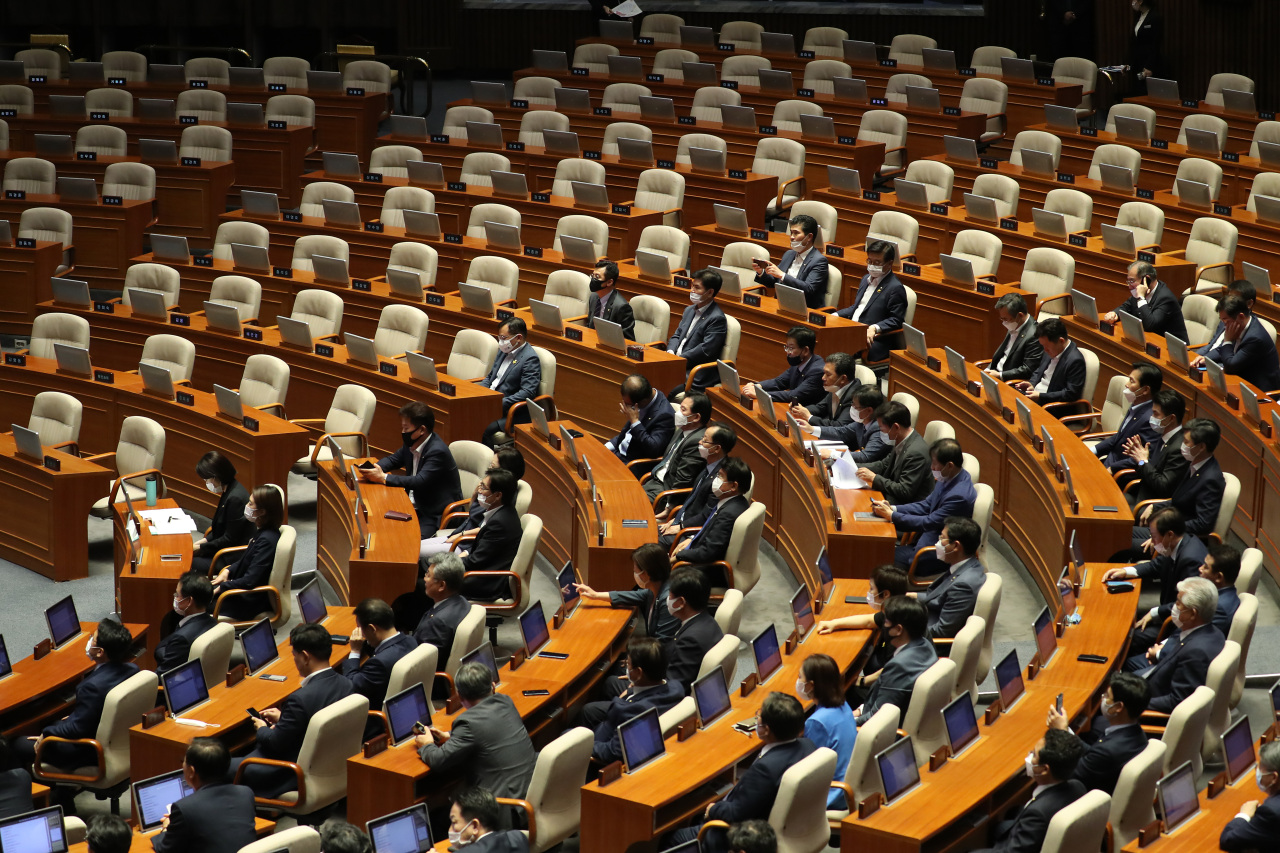Ruling party unilaterally takes chairman posts of all standing committees
By Park Han-naPublished : June 29, 2020 - 17:27

The ruling Democratic Party of Korea has strengthened its grip on the National Assembly, already heavily tilted to the left, by taking the chair posts of nearly all standing committees, after talks with the main opposition party on sharing them fell apart.
In a plenary session held on Monday, 181 lawmakers, including 176 from the Democratic Party, completed casting votes for the mainstream liberal party to secure 17 committee chairmanships out of 18. The chief of the Intelligence Committee was not elected as the seat requires consultation among the National Assembly speaker, deputy speakers and negotiation groups by law.
It marks the first time that a certain party has occupied all chair posts in 32 years, as ruling and opposition parties have shared them in accordance with their Assembly seats since the 13th National Assembly in 1988.
“The ruling and opposition parties drafted an agreement during talks on Sunday but failed to reach a final deal today. United Future Party said it won’t take the posts,” Assembly Speaker Park Byeong-seug of the ruling party said.
“I decided to complete the formation of standing committee as I can no longer disregard the citizens’ great concern over losing their jobs as a result of the economic fallout from the coronavirus,” he said.
Wrangling between the two rival parties has persisted since the current National Assembly began its four-year term on May 30.
The National Assembly has been at a standstill, as the rival parties had fought over the chairmanship of the Legislation and Judiciary Standing Committee, which has substantial gatekeeping power over judiciary-related bills and in examining the legality and terminology of bills passed by other committees.
Delays in structuring the unicameral parliament have led to a slow start, as pressing issues such as a review of the third supplementary budget bill await approval.
Failing to reach a deal, the Democratic Party elected six standing committee chiefs including the sought-after head of the judiciary, while the opposition boycotted votes on June 15.
Democratic Party floor leader Kim Tae-nyeon vowed to get the Assembly back to work and pass the government’s extra budget within this month’s extraordinary session which ends on July 3.
“The United Future Party should take all the responsibility for hampering the Assembly from working and causing the hardship of the people’s lives,” Kim said.
Defending the party’s decision to take all the committee chair posts, Kim said his party offered “the maximum concession,” while waiting for a month for the opposition to agree.
On Sunday, Kim and his counterparty came close to reaching an agreement to divide up the 18 committee chairs, eleven for the ruling party and seven for the opposition group. For the judiciary committee, they tentatively agreed to the Democratic Party taking the seat for the first two years of the Assembly term and give the remaining two years to the party that wins the 2022 presidential election.
United Future Party Floor leader Joo blamed the ruling party for abandoning cooperative governance and coexistence.
“The Democratic Party unilaterally took away (the chairmanship of) the judiciary committee by breaking a long tradition and (ignoring) the opposition. They didn’t accept my proposal to give the post to us for the latter half of the Assembly’s term,” he told reporters.
There has been a decadeslong tradition that a senior lawmaker of the largest opposition party chairs the judiciary committee.
Lawmakers of the minor Justice Party attended Monday’s plenary meeting but didn’t take part in the vote, blaming the collapsed talks between the rival parties that have led to a monopolization of a single party.
By Park Han-na (hnpark@heraldcorp.com)











![[Today’s K-pop] BTS pop-up event to come to Seoul](http://res.heraldm.com/phpwas/restmb_idxmake.php?idx=644&simg=/content/image/2024/04/17/20240417050734_0.jpg&u=)





![[KH Explains] Hyundai's full hybrid edge to pay off amid slow transition to pure EVs](http://res.heraldm.com/phpwas/restmb_idxmake.php?idx=652&simg=/content/image/2024/04/18/20240418050645_0.jpg&u=20240419100350)

![[Today’s K-pop] Zico drops snippet of collaboration with Jennie](http://res.heraldm.com/phpwas/restmb_idxmake.php?idx=642&simg=/content/image/2024/04/18/20240418050702_0.jpg&u=)